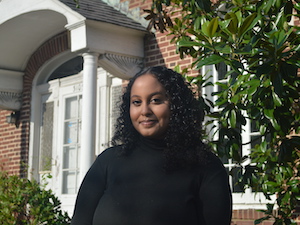2022 Week 5: Healthcare
Fatima Baloul | Shepherd’s Clinic
Morning Anxiety. It is a flame that sits in my stomach. Not necessarily rooted from my placement, but I felt it heavily as the summer began. Mainly due to the unknown; at the time, I was unfamiliar with the bus route from JHU to Shepherd’s Clinic, and I was overcome with worry of the day ahead. It all manifested into morning anxiety. CIIP and my experience at Shepherd’s Clinic has unexpectedly forced me to adjust my personal routine. I became more intentional with the mornings. Whether that be being awake 20 minutes earlier to have time for myself, in peace, that I could rely on, it provided me with a subtle, yet vital routine. I took a course over winter intersession. In that, I learned to not force myself to completely empty my mind and stop myself from having racing and incessant thoughts; I learned the art of coexisting with my thoughts. In the course, I was taught to picture myself on a riverbank, and the river would be flowing rapidly with my thoughts. I was taught to simply watch the river. Not interfere; not react. And within the 20 minutes that I intentionally set aside in the morning, I have that beautiful image in my mind, and I focus on it, routinely. Being in such a hustle – driven culture and environment, the distinction between our individual lives and our work is often blurred. I have absolutely been and currently am a victim of that. Simply having that brief time in the morning has truly revealed to me the gravity and the effects of intentionality and mindfulness specifically for ourselves, and I feel the flame, being morning anxiety, gradually lessening into a few occasional sparks.
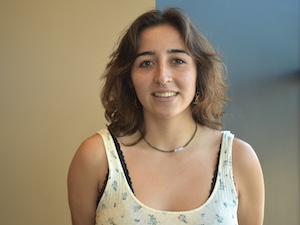 Emma Bocanegra | Esperanza Center
Emma Bocanegra | Esperanza Center
One of the most important things I’ve learned from my time spent at the Esperanza Center is to not doubt myself. As I’ve mentioned in my blogs throughout the course of the summer, I had a lot of fear and anxiety coming into this internship about my ability to communicate and understand patients speaking Spanish. Although I did require a bit of time to adjust to speaking my second language throughout the day, over the phone, and in a professional setting, I found that when I was able to compose myself and move beyond that feeling of overwhelming panic and fear of being incapable, I was always able to successfully communicate and understand people, even if my phrasing was imperfect or I had to ask the patient to repeat themselves a bit more slowly.
The lesson I’ve learned about being confident in my abilities will certainly carry forward with me throughout my career, but I think an even more important dimension to this lesson is the importance of communicating with my colleagues and the people around me to get the support I need to succeed. My supervisor was aware of my hesitations in speaking Spanish, particularly over the phone. When I have interactions with patients who speak more quickly or have accents that I have a harder time understanding, I usually will let them know that I’m still learning Spanish and I’ll ask them to please be patient with me when I need them to repeat themselves. Although it seems obvious and straightforward, my experiences this summer have highlighted the importance of thorough, straightforward, and honest communication. When I am in scenarios in the future of my career where I doubt my abilities or knowledge of a certain subject, instead of trying to blend in to make sure the people around me are unaware of my nerves or hesitations, I can speak up and ask questions, as well as let the people around me know that in order for me to do my best work, I might require a little bit more time or support to complete certain tasks.
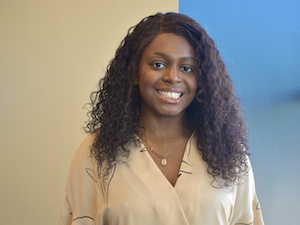 Dumebi Nwankwo | MOMCares
Dumebi Nwankwo | MOMCares
I began my internship with a few goals in mind. Some of which were to gain more networking skills and additionally project management skills. I can say I achieved these skills and much more. My placement at MOMCares allowed me to participate in assisting in maternal health work through various expectations required of me.
Here are a few things I learned. In the more practical/tangible sector, something significant I hadn’t expected to learn was office suite skills, specifically using google workspace. Prior to this summer, I would have rated my skills in excel/google sheets as moderate. Currently, I’d say give myself the same rating, however the difference now is I know significantly more than I before and it’s clear my original rating scale wasn’t as accurate as I believed. Although it was never a specific skill I was told to have, I hadn’t realized how many spreadsheets I’d have to create and manage. Good news, I can now say I know what a pivot table is.
Staying true to tangible skills, having a smaller team in non-profits means often all the promotional materials are done through the staff. With the help of the JHU Digital Media Center, I was able to learn how to use one of the DSLR cameras and not only collect content, but edit together clips from our Diaper Giveaways, to our Young Mothers program. Along with using a DSLR camera for the first time, I became a lot better at designing flyers and presentations with Canva. Although I was already familiar with Canva because of certain E-board positions, the amount of mini- presentations I created throughout the summer allowed me to improve on my eye for detail and efficiency in project completion.
Some skills that I acquired through training really stuck with me as well. Two in particular were Trauma-informed care training facilitated by Baltimore City Health Department’s Office of Youth & Trauma, as well as completion of the AHA Heartsaver First Aid CPR AED Program. I was offered both of these training sessions by MOMCares/ grant programming. I am extremely grateful to have been able to participate in both. As a premed student, there is so much importance in recognizing the effect of trauma and adverse childhood experience when interacting with youths. It was also very interesting to recognize the barriers I may have also faced without realizing.
Finally, the goal I was aiming to achieve, networking and consistency in communication. Talking to new people isn’t typically an issue for me, but I’ve noticed I typically experience a lot of anxiety when it comes to maintaining these relationships in a professional sense. Due to the community outreach events I’ve participated in, resource meetings, external communications, and co-facilitation of the Young Mothers Program, I’ve become a point of contact for many outside the MOMCares network. Being able to stay organized with this through trello and extensive scheduling on google calendar has actually helped me fight the initial anxiety and succeed in creating these connections. Great news too, through a MOMCares community outreach event, I actually became connected to a PHD candidate conducting research focused on Black Maternal Birth outcomes. Through this I was able to further speak to her and subsequently join her lab which I will be focusing on after the summer ends.
 Stacey Tang | Healthcare for the Homeless
Stacey Tang | Healthcare for the Homeless
This week, one thing that has resonated with me is the interconnectedness of so many parties that fall under society. I was tasked with calling several property managers, centers that offer programs to recover from substance abuse, employment centers and institutions that provide legal services, all with the ultimate goal to ensure that clients have the most up to date information about what resources exist in Baltimore. When calling all of these groups, I was surprised to learn how interconnected they were and how many were not only aware of our organization, but also of each other. Because I was cold calling many of these groups, I was scared that many would be hesitant to provide me with information about the services their organization provides because I am like an outsider, but to my surprise, everyone who picked up welcomed my call graciously and were able to assist me in my endeavors. Some referred me to other groups that were on my list, and one person I called even referred me to the Maryland Association for the Treatment of Opioid Dependence and findtreatment.gov, a service started by the Substance Abuse and Mental Health Services Administration, which greatly sped up my search and call process.
Aside from the relationships built between organizations out of partnership, it was also interesting to think about the intersectionality of funding. I had the honor of speaking to Margaret, the senior director of quality assurance, and from her I was able to hear just how intricate the public grant process is and how major news events or changes in legislation have a large impact on the grants received. Maybe it is because I am still a student, but I find it difficult to imagine how large changes can play a role in the paycheck I am able to take home at the end of each month. Further, I originally wanted to pursue a field of medicine like pediatrics to escape from the thoughts of the economy because service is always something that will be in demand, but it is something that I need to be more cognizant of as I march closer to escaping the world of academia because it ultimately does affect not just me, but clients as well. Economic stability is such a huge factor of the social determinants of health but because of the society we live in, it is difficult to reach a point where all can be economically stable without the expense of someone else. I am hopeful that organizations like HCH can serve as the stepping stone to reducing some of the strain from economic instability and instead of bringing each other down, maybe organizations like HCH can continue to work in partnership with other community organizations to reduce the competition and strain that comes when thinking about funding.
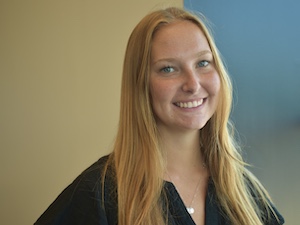 Teagan Toomre | Keswick Multi-Care Center
Teagan Toomre | Keswick Multi-Care Center
I think one major thing I’ve learned through this summer that I’ll carry with me is just broadly how to act and contribute in a professional environment. In this internship, and I imagine in any sort of entry-level job or maybe just job in general, it takes a while to get acclimated and begin to feel comfortable and like you’re making any sort of contribution to the organization overall. This is really normal and something people talk about a lot when it comes to internships, but I think actually experiencing it and sitting in the discomfort is different than just hearing about it generally. I think my mornings of being unsure where the day would take me or what work I would have kind of forced me to poke my head into things, talk to more people I wouldn’t have otherwise talked to, and take some more initiative on different projects that maybe I wouldn’t have if a lot of work had been given to me up front. It’s totally normal to take time to get adjusted and feel like you belong in your position, and at first I was really uncomfortable in this adjustment. Looking back, I’m grateful for that.
One thing I’ll take with me to future jobs and in life in general is that these in-between periods are completely normal but also temporary. I spent the first few weeks at my placement wondering if the in-betweenness would last for 8 weeks, but now I can look back and see that it really was just temporary. I think having that assurance that it won’t last forever will be really helpful in the future when I start questioning things. I hope I also take the experience I gained in advocating for myself and helping out where I can into future positions, because I think I learned a lot from that experience, too.
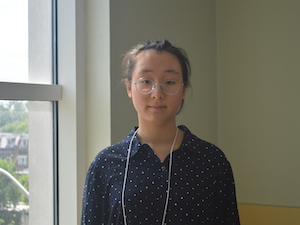 Sellina Yoo | MERIT
Sellina Yoo | MERIT
The biggest thing I’ve learned is flexibility. At the beginning of the summer, I really insisted on having a set schedule, and was very stressed whenever we deviated from that schedule. However, as I realized that the nature of my work does not lend itself to a set schedule. The Summer Service Learning Program always has updates in the evening, and I have to be ready to accommodate for those. In return, I get a lot of freedom in the morning before 12pm to do what I believe needs to be done. I think flexibility is important because as I head off into medicine and hopefully become a doctor, it will be difficult for me to always have a set schedule. I need to be open to emergencies and be calm and solution-oriented when those times come. I also learned to accept that I cannot be perfect. I am a perfectionist, and I always want to be showing my best work. However, this summer, balancing lots of tasks at work and also outside of work, I realized that it’s okay to let myself go and be a little bit nicer to myself. Of course, I still complete my tasks on time, but I don’t always stress about the minor details or being absolutely perfect at every staff meeting. This is such an important quality to have because I can find balance in my life. I’m very bad at finding balance and being someone who can multitask, so I think this was an important lesson for me. In the workplace, I believe that this helps me be an efficient worker and work smart, not hard. Though working hard is ideal and is obviously commended, I think that working smart is more sustainable in the long term for my mental health and the success of the department and organization I’m working with.

